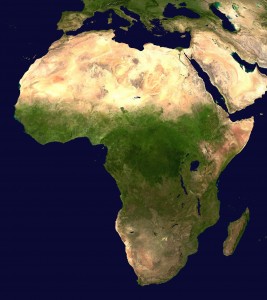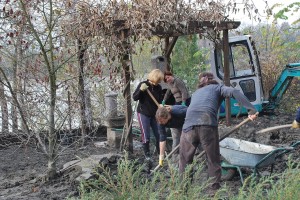The Duke of Edinburgh’s International Award Foundation works tirelessly in Africa to bring the award programme to young people across the continent. As a Nigerian philanthropist and a Fellow of the Duke of Edinburgh’s World Fellowship, this is an endeavour close to the heart of entrepreneur Tunde Folawiyo.
The Duke of Edinburgh Award scheme was founded in 1956, with the aim of helping young people, no matter what their background, to reach their full potential. The Duke of Edinburgh Award scheme’s mission is to develop the mind, body and soul of young people, through teamwork and practical activities. The scheme aims to build confidence and self-esteem in youths all over the world.
On the African continent, the Duke of Edinburgh Award scheme has changed the lives of millions of young people. Kenyan-born Julius Irungu Krush grew up in the slums of Mathare, as the youngest son of a single mother who had three other children to care for. Their makeshift shelter had no electricity, sanitation or running water. Julius’s family were under constant threat; opportunist crime is rife in the slum areas of Mathare, not to mention their vulnerability to the elements and natural disasters. School fees slid beyond Julius’s mother’s grasp as she struggled to feed her children, let alone herself.
The Mathare slums are located three miles to the east of Nairobi’s central business district. The area is approximately two miles long by one mile wide, and is estimated to be inhabited by over 700,000 people. Survival is a daily battle for the residents of Mathare, with lawlessness, crime and disease claiming lives by the day, if not the hour.
Dwellings consist of makeshift 6×8 structures, in a maze of alleyways and open, raw sewers. It is a miracle to think that humankind can survive in such conditions – let alone flourish – but the manner in which some residents conduct themselves in such adverse conditions is a testament to the tenacity of the human spirit.
For slum-dwellers like Julius, there is little access to basic amenities like healthcare, clean water and food. A fire in the slums can claim the lives of hundreds or thousands; there are no emergency services. The makeshift huts are constructed from mud or metal. There is no government security. Residents of the Mathare slums are at the mercy of lawless tribal gangs each and every day.
Even basic sanitation is considered a luxury that few slum-dwellers can afford. Payment is demanded upfront before an inhabitant can use one of the few filthy public bathrooms. There is no refuse collection system. It is understandable that disease is rife in such circumstances.
Julius dropped out of school twice. Recounting the despondency of the slums, he acknowledges that he almost gave up hope for a better future and succumbed to the poverty trap. As an adolescent surrounded by negative peer pressure, with no confidence, dreams or ambition, Julius tried to kill himself.
 Julius’s life was turned around when he discovered the Duke of Edinburgh’s International Award scheme. He enrolled, and within just six months achieved his Bronze Award, quickly going on to gain his Silver and Gold. Along the way, Julius has reaped so many rewards, including inspiration and a new-found sense of self. The experience has changed Julius’s life forever. While studying under the Service section, he learnt the importance of working with others towards improving his community, to such an extent that after achieving his Gold Award, Julius went on to found his own mentorship programme. It is called ‘Raising Hope’, and its mission is to inspire the children of the Mathare slums.
Julius’s life was turned around when he discovered the Duke of Edinburgh’s International Award scheme. He enrolled, and within just six months achieved his Bronze Award, quickly going on to gain his Silver and Gold. Along the way, Julius has reaped so many rewards, including inspiration and a new-found sense of self. The experience has changed Julius’s life forever. While studying under the Service section, he learnt the importance of working with others towards improving his community, to such an extent that after achieving his Gold Award, Julius went on to found his own mentorship programme. It is called ‘Raising Hope’, and its mission is to inspire the children of the Mathare slums.
Stories like this will strike a chord with Duke of Edinburgh Fellows such as Tunde Folawiyo. It is what the Duke of Edinburgh’s Africa mission is all about. Tunde Folawiyo is the Director of the African Leadership Academy, an institution aimed at finding young African students who show promise and, through its scholarship programmes, honing the skills of Africa’s potential political leaders of tomorrow.
The Duke of Edinburgh Award scheme was founded by the Duke of Edinburgh, husband of Queen Elizabeth II of Great Britain, in 1956. Over the years, the scheme has been rolled out across schools all over Great Britain, with programmes expanding across 140 countries worldwide. The Duke of Edinburgh’s International Award Foundation promotes the award scheme abroad and acts as a co-ordinating body for international award sponsors.
Since the first Duke of Edinburgh Award ceremony in 1956, over a million young people have taken part in the scheme in Great Britain, with over eight million youths participating worldwide. Today, there are around 300,000 participants each year. With the assistance of their leaders, participants choose objectives from each of the following criteria:
- Volunteering
Undertaking service to the community or to individuals directly
- Physical
Improving in an area of dance, sport or fitness activity
- Skills
Developing social and practical skills and personal interests
- Expedition
Planning, training and completion of an adventurous journey
- Residential
Involves staying away from home and working towards a shared activity
The Bronze Award takes 3-6 months on average to achieve; Silver takes 6-9 months; Gold takes 12-18 months. In this way, each level demands more time from participants, illustrating a deeper level of commitment.
The Duke of Edinburgh Award Scheme is aimed at young people across the world, whatever their background. Its mission is to help them achieve their true potential through inspiration, education and the realisation of what can be accomplished by working with others as a team.


![By Cedarrapidsboy (Own work) [Public domain], via Wikimedia Commons Tunde Folawiyo](http://upload.wikimedia.org/wikipedia/commons/thumb/4/40/Niabi_zoo_lion.jpg/256px-Niabi_zoo_lion.jpg) out-with each country. This is no more apparent than through the critical conservation work carried out by those in Africa seeking the award.
out-with each country. This is no more apparent than through the critical conservation work carried out by those in Africa seeking the award. and talents which will serve them well into adulthood. One such project is the 2015 Morocco Duke of Edinburgh Trek.
and talents which will serve them well into adulthood. One such project is the 2015 Morocco Duke of Edinburgh Trek. For Christian Owen, a young deaf student, the lack of understanding regarding BSL (British Sign Language) was his biggest source of frustration. He decided to use his involvement in the DofE to do something about this; he wanted to make this language more accessible to the general public, and so chose to produce the world’s first ever manual for BSL.
For Christian Owen, a young deaf student, the lack of understanding regarding BSL (British Sign Language) was his biggest source of frustration. He decided to use his involvement in the DofE to do something about this; he wanted to make this language more accessible to the general public, and so chose to produce the world’s first ever manual for BSL.![By Kim Traynor (Own work) [CC-BY-SA-3.0 (http://creativecommons.org/licenses/by-sa/3.0)], via Wikimedia Commons Tunde Folawiyo](http://upload.wikimedia.org/wikipedia/commons/thumb/b/bf/Palace_of_Holyroodhouse%2C_Edinburgh.jpg/256px-Palace_of_Holyroodhouse%2C_Edinburgh.jpg) The ceremony took place at the Palace of Holyroodhouse, and was attended not only by the award recipients and their families, but also by a number of celebrities from the sport, entertainment, music and art industries. Some of the top names included David Murdoch, the Olympic curler, and Kevin Guthrie, the actor who starred in the production ‘Sunshine on Leith’.
The ceremony took place at the Palace of Holyroodhouse, and was attended not only by the award recipients and their families, but also by a number of celebrities from the sport, entertainment, music and art industries. Some of the top names included David Murdoch, the Olympic curler, and Kevin Guthrie, the actor who starred in the production ‘Sunshine on Leith’. A Munro is defined as a mountain in Scotland boasting a height of over 3,000 ft. These were named for Sir Hugh Munro, who compiled the first list of these hills – Munros Tables – during 1891. Today, the most widely-recognised of the Munros is Ben Nevis, the British Isles’ highest mountain. Climbing Scotland’s Munros is a thrilling experience not to be missed.
A Munro is defined as a mountain in Scotland boasting a height of over 3,000 ft. These were named for Sir Hugh Munro, who compiled the first list of these hills – Munros Tables – during 1891. Today, the most widely-recognised of the Munros is Ben Nevis, the British Isles’ highest mountain. Climbing Scotland’s Munros is a thrilling experience not to be missed.

